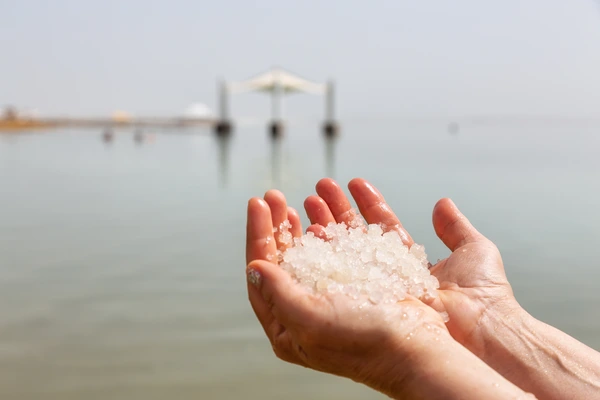Your formulation is perfect. Your specs are dialed in. But customers keep saying your premium products have a metallic or bitter taste.
It’s frustrating, especially when you’ve done everything right on the R&D side. But sometimes, the problem isn’t in your recipe at all. It’s in where your salt comes from.
Mined salt costs less and is easier to get, but it often carries flavor compounds that clash with your carefully planned taste profiles. Instead of enhancing your product’s natural flavors, it adds a metallic finish that even good seasoning can’t hide.
That’s why more food manufacturers are starting to ask a simple question: Where does our salt actually come from?
Why Salt Origin Affects Flavor
When teams buy salt, they usually start with the basics: price, availability, and specs. Flavor doesn’t always make the list – but it should.
Where salt comes from directly affects how your final product tastes.
That impact is even bigger when salt plays a central role in your recipe or when clean, pure flavors are essential.
Mined salt can cause problems like:
- Metallic or bitter aftertaste from underground minerals
- Processing chemicals that affect taste
- Limited ability to customize the mineral content
Sea salt, on the other hand, offers:
- Cleaner, more neutral taste
- Natural trace minerals that enhance flavor
- More processing options
For R&D teams focused on flavor, the source matters just as much as the spec sheet.
Why Dead Sea Salt Tastes Better
This is where Dead Sea salt stands apart. It starts from a completely different place than regular mined or ocean salt.
Naturally concentrated from the start. Dead Sea water contains 33–34% salt, about ten times more than the average ocean. This super-salty environment has been building its mineral profile for millions of years, creating salt that’s exceptionally clean-tasting.
Minerals that help, not hurt. While mined salts often carry compounds that create metallic notes, the minerals in Dead Sea salt help produce a more balanced, neutral flavor. They let your food’s natural flavors shine instead of competing with them.
Here’s what that means for your products:
- Cleaner taste in seasoning blends
- Better flavor clarity
- No metallic or bitter aftertaste
- Premium quality your customers notice
Those results aren’t by chance. At TEKPAK, we start with Dead Sea minerals that are already concentrated and flavor-neutral, so we can focus on enhancing what’s good instead of battling to remove what’s bad.
The result is salt that does exactly what it should: bring out the best in your product without adding a trace of bitterness.
Flexible Options for Different Needs
Better flavor is only part of the equation. The real value comes when that quality fits your production and sourcing strategy, without adding complexity.
That’s why TEKPAK offers Dead Sea salt in formats that work for different manufacturing priorities:
- For reduced sodium blends: Our proprietary blends, like TP57, make it easy to meet sodium targets without sacrificing taste. Because both minerals come from the same source, the flavor stays clean and the ratios stay consistent from batch to batch.
- For custom recipes: If you prefer full control over your sodium chloride and potassium chloride ratios, we supply each component individually. You’ll still get the Dead Sea flavor advantage in every formulation.
- For clean label positioning: In some applications, single-source Dead Sea blends may help simplify labeling. When that’s not a priority, you can list components separately and still keep superior flavor.
- For heart-healthy positioning: Potassium chloride can be labeled as “potassium salt,” supporting health-forward claims while keeping the taste clean and balanced.
No matter which path you choose, you’re sourcing from one place, which means consistent flavor, reliable supply, and fewer sourcing headaches.
Reliable Supply from a Unique Source
The right salt isn’t just about taste – it’s about having it when you need it. Even the best formulation can stall if your ingredient supply can’t keep up.
Traditional salt supply chains can be unpredictable:
- Seasonal gaps that interrupt production schedules
- Weather-dependent harvests limit flexibility
- Variations between batches affect product consistency
- Long lead times for specialty needs
Dead Sea salt avoids many of these pitfalls.
With year-round processing and a stable mineral makeup, the source itself is consistent and predictable.
TEKPAK builds on that advantage by keeping substantial inventory in North America and working directly with manufacturers to anticipate needs.
That means fewer production delays, faster turnaround for recipe changes, and steady quality across every batch. For teams managing complex ingredient buying, that reliability can be the difference between hitting a launch date and explaining a missed one.
3 Key Questions When Choosing a Salt Supplier
Before locking in a supplier, procurement and R&D teams should ask:
- Does this salt source help or hurt my product's flavor? Metallic or bitter notes from mined sources can ruin even the best recipes.
- Can the supplier provide both individual components and blends with consistent quality? Flexibility in sourcing helps different product lines and labeling needs.
- Do they keep inventory in the US for steady supply? Consistent availability protects against production delays and quality changes.
If you can’t answer “yes” to all three, you may be setting yourself up for flavor complaints, reformulation costs, or supply chain headaches later.
Looking for Better Salt? Start with the Source
If metallic aftertaste, inconsistent flavor, or supply delays sound familiar, your salt source could be the real issue.
Dead Sea salt offers a cleaner taste, flexible sourcing options, and a reliable year-round supply. And TEKPAK makes the switch easy.
Whether you need individual components, custom blends, or something that matches your current specs, we’re ready to help.
Want to taste the difference? Let’s talk. We’ll send samples and explore how Dead Sea salt can work in your products.
